- 0086-571-85302990
- sales@greenskybio.com
Components of natural grape seed extract in fertilizers and feeds.
2024-12-01

1. Introduction
Grape Seed Extract has emerged as a significant component in both fertilizers and feeds in recent years. It is a natural by - product obtained from grape seeds, which are usually considered waste in the winemaking process. However, modern research has discovered its great potential in enhancing plant growth in fertilizers and improving animal nutrition and performance in feeds. This article aims to comprehensively explore the various aspects of natural Grape Seed Extract in these two applications.
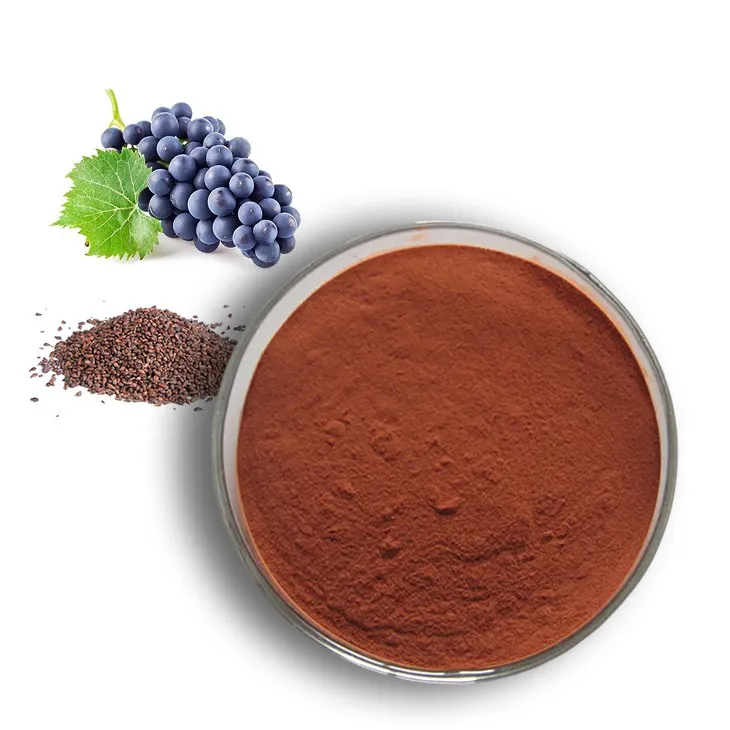
2. Chemical Composition of Grape Seed Extract
Grape seed extract is rich in a variety of bioactive compounds. Proanthocyanidins are one of the most important components, which are a type of flavonoid polymer. They possess strong antioxidant properties. These proanthocyanidins can be further divided into different oligomeric and polymeric forms. For example, dimeric, trimeric, and tetrameric proanthocyanidins are commonly found in grape seed extract.
Another significant component is phenolic acids, such as gallic acid and ellagic acid. These phenolic acids also contribute to the antioxidant activity of the extract. They can scavenge free radicals and protect cells from oxidative damage.
There are also small amounts of flavonols like Quercetin and kaempferol in grape seed extract. Flavonols play important roles in various biological processes, including antioxidant, anti - inflammatory, and antimicrobial activities.
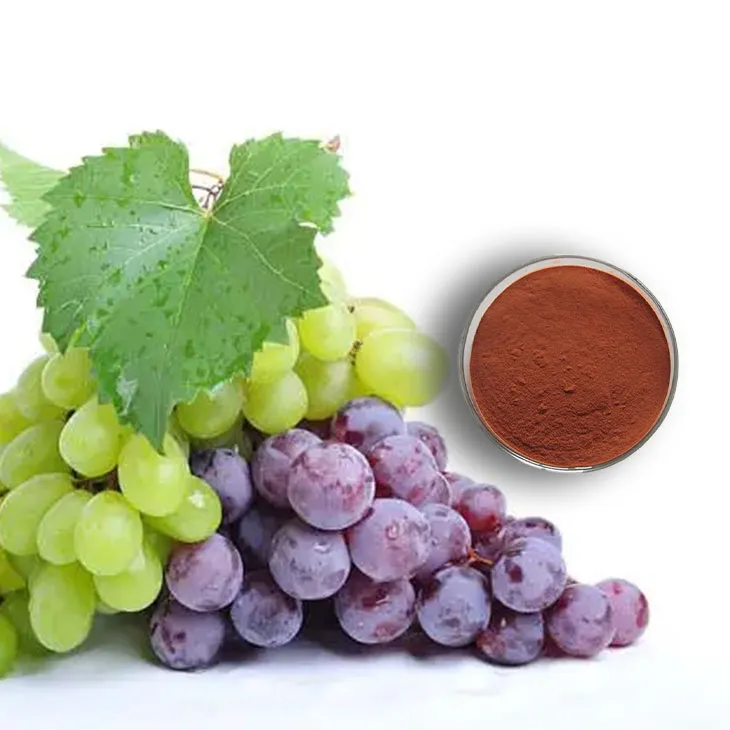
3. Grape Seed Extract in Fertilizers
3.1. Effects on Soil
When grape seed extract is added to fertilizers, it can have positive impacts on the soil. One of the main effects is on soil structure. The organic compounds in the extract can help improve soil aggregation. This means that soil particles are more likely to clump together in a beneficial way. For example, it can prevent soil erosion by making the soil more stable.
It also affects soil microbiology. The extract can act as a food source for beneficial soil microorganisms such as bacteria and fungi. These microorganisms play crucial roles in nutrient cycling. For instance, some bacteria can convert nitrogen from the air into a form that plants can use, and the presence of grape seed extract can promote their growth and activity.
3.2. Promotion of Plant Growth
Grape seed extract can enhance plant growth in multiple ways. Nutrient uptake is improved. The extract can chelate certain nutrients, making them more available for plants to absorb. For example, it can chelate iron, which is an essential nutrient for plants. Iron deficiency can lead to chlorosis (yellowing of leaves), and by improving iron availability, grape seed extract can help plants maintain healthy green leaves.
It also has a role in stress tolerance of plants. The antioxidant properties of the extract can help plants deal with environmental stresses such as drought, salinity, and high temperature. When plants are exposed to these stresses, they produce reactive oxygen species (ROS) which can damage cells. The antioxidants in grape seed extract can scavenge these ROS, reducing the damage and allowing plants to better tolerate the stress.
Moreover, grape seed extract can stimulate root growth. A strong root system is essential for plants to absorb water and nutrients from the soil. The bioactive compounds in the extract can promote root cell division and elongation, leading to a more extensive and healthy root system.
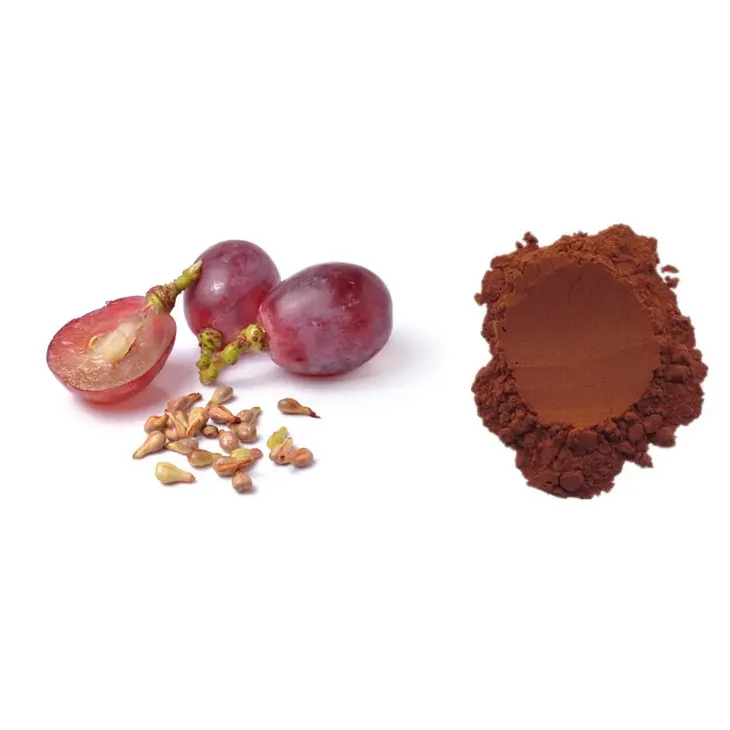
4. Grape Seed Extract in Feeds
4.1. Nutritional Benefits for Animals
For animals, grape seed extract in feeds offers several nutritional benefits. It is a rich source of antioxidants. These antioxidants can protect animal cells from oxidative damage, which is important for maintaining overall health. For example, in poultry, oxidative stress can lead to reduced egg production and poor meat quality. The antioxidants in grape seed extract can prevent such issues.
It also contains bioactive compounds that can improve digestive function. The phenolic compounds in the extract can modulate the gut microbiota. A healthy gut microbiota is crucial for proper digestion and absorption of nutrients. By promoting the growth of beneficial bacteria in the gut, grape seed extract can enhance the digestive efficiency of animals.
4.2. Impact on Animal Performance
In terms of animal performance, grape seed extract can have positive effects. In livestock such as cattle, it can improve weight gain. The enhanced nutrient absorption and antioxidant protection provided by the extract contribute to better growth. Animals are able to convert feed more efficiently into body mass, leading to increased weight gain over time.
For dairy animals, it can affect milk production and quality. The extract can potentially increase milk yield by improving the overall health and nutrient utilization of the animals. Additionally, it may also improve the quality of milk in terms of its nutritional composition, for example, by increasing the content of certain beneficial fatty acids.
In the case of poultry, grape seed extract can enhance egg production and quality. It can reduce the incidence of problems such as weak eggshells and improve the nutritional content of the eggs, making them more marketable.
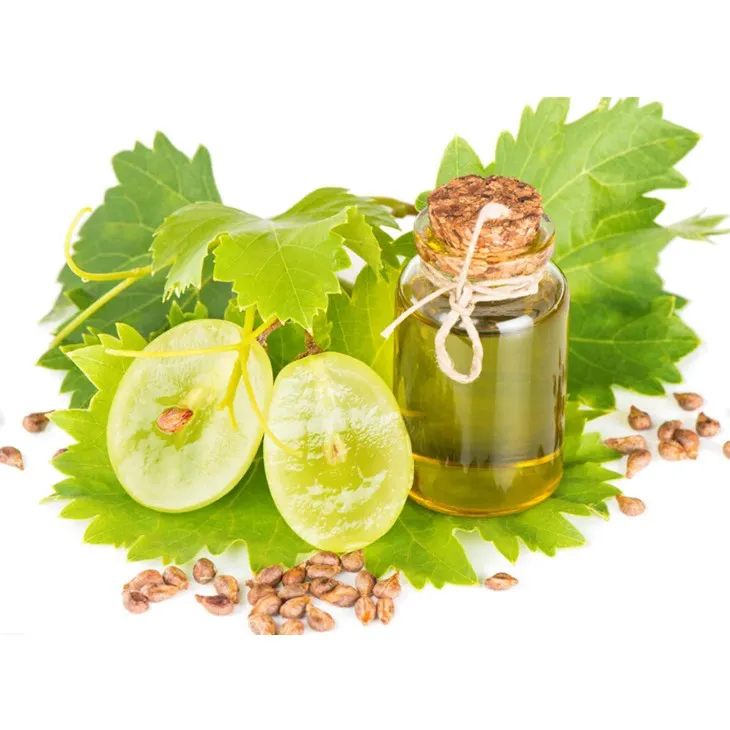
5. Safety and Regulatory Considerations
When using grape seed extract in fertilizers and feeds, safety is of utmost importance. In terms of fertilizers, there is a need to ensure that the extract does not contain any harmful substances that could contaminate the soil or be taken up by plants in a harmful way. For example, heavy metals should be within acceptable limits.
For feeds, regulatory bodies have specific requirements. The extract must be sourced from reliable suppliers and meet quality and safety standards. There are regulations regarding the maximum allowable levels of certain compounds in feeds to ensure the safety of the animals consuming the feed and the safety of the food products derived from these animals, such as meat, milk, and eggs.
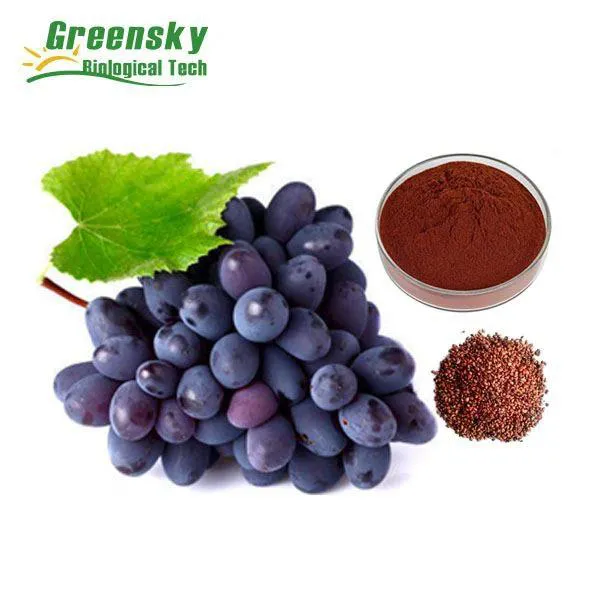
6. Conclusion
Natural grape seed extract has shown great potential as a component in fertilizers and feeds. Its unique chemical composition, including proanthocyanidins, phenolic acids, and flavonols, endows it with various beneficial properties. In fertilizers, it can improve soil quality and promote plant growth. In feeds, it offers nutritional benefits to animals and positively impacts their performance. However, proper safety and regulatory compliance are necessary to ensure its effective and safe use in both applications. Future research may focus on further optimizing its use, exploring new extraction methods to enhance its bioactivity, and investigating its long - term effects in different agricultural and animal husbandry systems.
FAQ:
What are the main components of natural grape seed extract?
Natural grape seed extract contains a variety of components. It is rich in phenolic compounds, such as proanthocyanidins. These phenolic compounds play important roles in its functions both in fertilizers and feeds.
How does grape seed extract in fertilizers improve plant growth?
The phenolic compounds in grape seed extract can act as antioxidants in the soil environment. They can also enhance the plant's resistance to various stresses. For example, they may help plants better tolerate drought or disease, thus promoting overall plant growth.
What are the positive impacts of grape seed extract in feeds on animal nutrition?
In feeds, grape seed extract can improve the antioxidant status of animals. It may also enhance the digestibility of certain nutrients. For instance, it can help in better absorption of fats and proteins, which is beneficial for animal nutrition.
How does grape seed extract in feeds affect animal performance?
Grape seed extract in feeds can lead to improved animal performance. It can enhance growth rate, as it helps in better nutrient utilization. It may also improve the immune function of animals, reducing the incidence of diseases and thus contributing to better overall performance.
Is the use of grape seed extract in fertilizers and feeds cost - effective?
The cost - effectiveness of using grape seed extract in fertilizers and feeds depends on various factors. While the initial cost of incorporating it might seem high, considering the potential benefits such as improved plant growth and animal performance, it can be a cost - effective option in the long run. However, more research is needed to fully assess its economic viability in different scenarios.
Related literature
- The Role of Grape Seed Extract in Agricultural Applications"
- "Grape Seed Extract: A Promising Component in Animal Feed"
- "Chemical Composition of Grape Seed Extract and Its Impact on Fertilization"
- ▶ Hesperidin
- ▶ citrus bioflavonoids
- ▶ plant extract
- ▶ lycopene
- ▶ Diosmin
- ▶ Grape seed extract
- ▶ Sea buckthorn Juice Powder
- ▶ Beetroot powder
- ▶ Hops Extract
- ▶ Artichoke Extract
- ▶ Reishi mushroom extract
- ▶ Astaxanthin
- ▶ Green Tea Extract
- ▶ Curcumin Extract
- ▶ Horse Chestnut Extract
- ▶ Other Problems
- ▶ Boswellia Serrata Extract
- ▶ Resveratrol Extract
- ▶ Marigold Extract
- ▶ Grape Leaf Extract
- ▶ blog3
- ▶ blog4
-
The best lemon juice powder in nature.
2024-12-01
-
Organic Vitamin K2 Powder Suppliers
2024-12-01
-
Bulk purchase of L - tyrosine.
2024-12-01
-
Vitamin K2 Manufacturers
2024-12-01
-
100% Pure Natural Rutin.
2024-12-01
-
Chinese Citrus Bioflavonoid Suppliers.
2024-12-01
-
Tamarind extract powder
2024-12-01
-
Cactus Extract
2024-12-01
-
Stevia Extract
2024-12-01
-
Shikonin
2024-12-01
-
Peppermint Oil
2024-12-01
-
Sea buckthorn oil
2024-12-01
-
Red Date Extract
2024-12-01
-
Green coffee bean Extract
2024-12-01
-
Tongkat Ali Extract
2024-12-01
-
Chasteberry Extract
2024-12-01





















